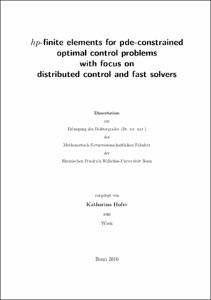Hofer, Katharina: hp-finite elements for pde-constrained optimal control problems with focus on distributed control and fast solvers. - Bonn, 2016. - Dissertation, Rheinische Friedrich-Wilhelms-Universität Bonn.
Online-Ausgabe in bonndoc: https://nbn-resolving.org/urn:nbn:de:hbz:5n-44542
Online-Ausgabe in bonndoc: https://nbn-resolving.org/urn:nbn:de:hbz:5n-44542
@phdthesis{handle:20.500.11811/6868,
urn: https://nbn-resolving.org/urn:nbn:de:hbz:5n-44542,
author = {{Katharina Hofer}},
title = {hp-finite elements for pde-constrained optimal control problems with focus on distributed control and fast solvers},
school = {Rheinische Friedrich-Wilhelms-Universität Bonn},
year = 2016,
month = sep,
note = {In this thesis hp-finite element methods are applied to linear quadratic optimal control problems subject to partial differential equations.
In particular two kind of model problems are considered: a boundary control problem and a distributed optimal control problem. Both problems are discretized with variational discretization due to Hinze, that means only the state and the adjoint are discretized, whereas the control is discretized implicitly via the projection formula.
Due to the projection formula, which separates the domain in active and inactive parts, a rough knowledge on the regularity of the solution is given. Since the parts with low regularity are at the interfaces between active and inactive set and corners of the domain, there h-refinement has to be applied. In all other parts of the domain, p-refinement can be applied.
In the case of boundary control all interfaces between active and inactive sets are at the boundary. Suitable hp-refinements -- as boundary concentrated refinement or vertex concentrated refinement -- are already known. Here, a third suitable refinement, a Neumann boundary concentrated refinement with additional h-refinement in corners is proposed.
In case of distributed optimal control the interfaces between active and inactive sets have to be determined. Then, a h-refinement on the interface between these sets combined with either using a-priori information only or in combination with error estimators is suggested.
Both model problems are solved with a semismooth Newton method. For the optimal boundary control problem several numerical experiments in three dimensions are presented. For the distributed optimal control problem several two-dimensional examples are considered. For both problems the results are compared with uniform h-refinement. The numerical experiments show in both cases a decrease of the number of degrees of freedom compared to the L2-error. Furthermore, these examples demonstrate, that the proposed refinement strategies for the distributed optimal control problem work very well.
The final part of this thesis considers the efficient solution of the discretized optimization problems. Here the semismooth Newton method, where in each iteration step a linear system of algebraic equations has to be solved, is used. The algebraic equation system can be written as symmetric but indefinite problem and has a saddle point structure. Here three different iterative solvers with preconditioners which belong to Krylov subspace methods are investigated.
The main results are the h, p and a independent condition number in case of using the Schöberl-Zulehner PCG in combination with suitable preconditioners. For the MINRES at least h and p independent iteration numbers are possible. Furthermore a preconditioner for the GMRES is proposed. At the end, for all three Krylov subspace methods numerical examples are presented in order to confirm the theoretical results.},
url = {https://hdl.handle.net/20.500.11811/6868}
}
urn: https://nbn-resolving.org/urn:nbn:de:hbz:5n-44542,
author = {{Katharina Hofer}},
title = {hp-finite elements for pde-constrained optimal control problems with focus on distributed control and fast solvers},
school = {Rheinische Friedrich-Wilhelms-Universität Bonn},
year = 2016,
month = sep,
note = {In this thesis hp-finite element methods are applied to linear quadratic optimal control problems subject to partial differential equations.
In particular two kind of model problems are considered: a boundary control problem and a distributed optimal control problem. Both problems are discretized with variational discretization due to Hinze, that means only the state and the adjoint are discretized, whereas the control is discretized implicitly via the projection formula.
Due to the projection formula, which separates the domain in active and inactive parts, a rough knowledge on the regularity of the solution is given. Since the parts with low regularity are at the interfaces between active and inactive set and corners of the domain, there h-refinement has to be applied. In all other parts of the domain, p-refinement can be applied.
In the case of boundary control all interfaces between active and inactive sets are at the boundary. Suitable hp-refinements -- as boundary concentrated refinement or vertex concentrated refinement -- are already known. Here, a third suitable refinement, a Neumann boundary concentrated refinement with additional h-refinement in corners is proposed.
In case of distributed optimal control the interfaces between active and inactive sets have to be determined. Then, a h-refinement on the interface between these sets combined with either using a-priori information only or in combination with error estimators is suggested.
Both model problems are solved with a semismooth Newton method. For the optimal boundary control problem several numerical experiments in three dimensions are presented. For the distributed optimal control problem several two-dimensional examples are considered. For both problems the results are compared with uniform h-refinement. The numerical experiments show in both cases a decrease of the number of degrees of freedom compared to the L2-error. Furthermore, these examples demonstrate, that the proposed refinement strategies for the distributed optimal control problem work very well.
The final part of this thesis considers the efficient solution of the discretized optimization problems. Here the semismooth Newton method, where in each iteration step a linear system of algebraic equations has to be solved, is used. The algebraic equation system can be written as symmetric but indefinite problem and has a saddle point structure. Here three different iterative solvers with preconditioners which belong to Krylov subspace methods are investigated.
The main results are the h, p and a independent condition number in case of using the Schöberl-Zulehner PCG in combination with suitable preconditioners. For the MINRES at least h and p independent iteration numbers are possible. Furthermore a preconditioner for the GMRES is proposed. At the end, for all three Krylov subspace methods numerical examples are presented in order to confirm the theoretical results.},
url = {https://hdl.handle.net/20.500.11811/6868}
}






